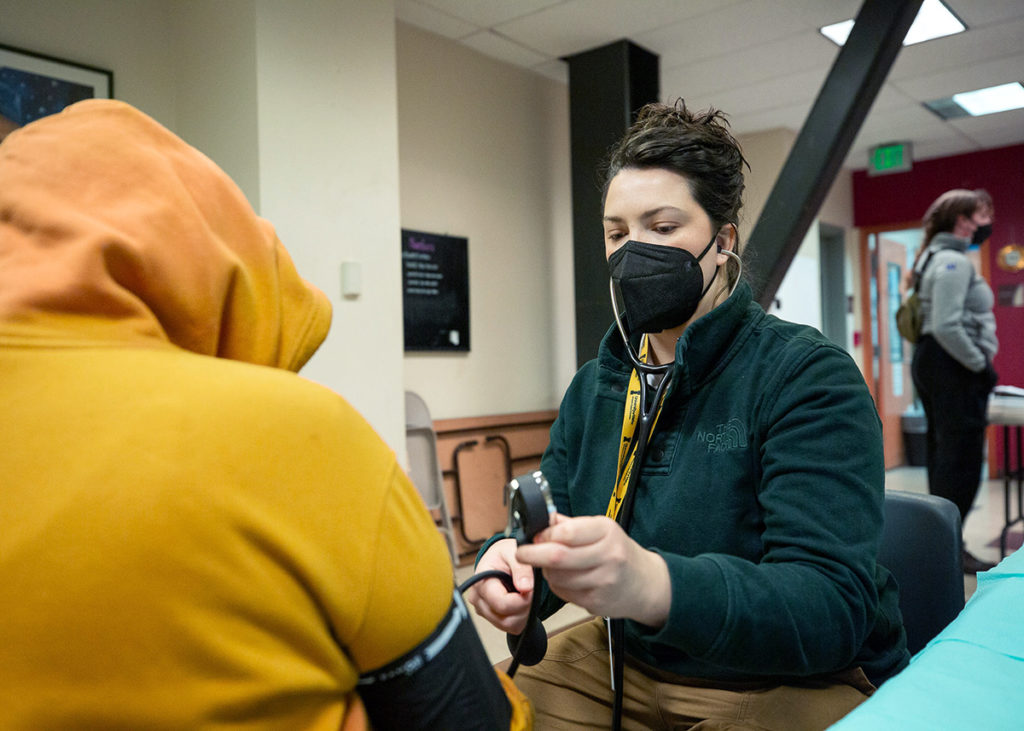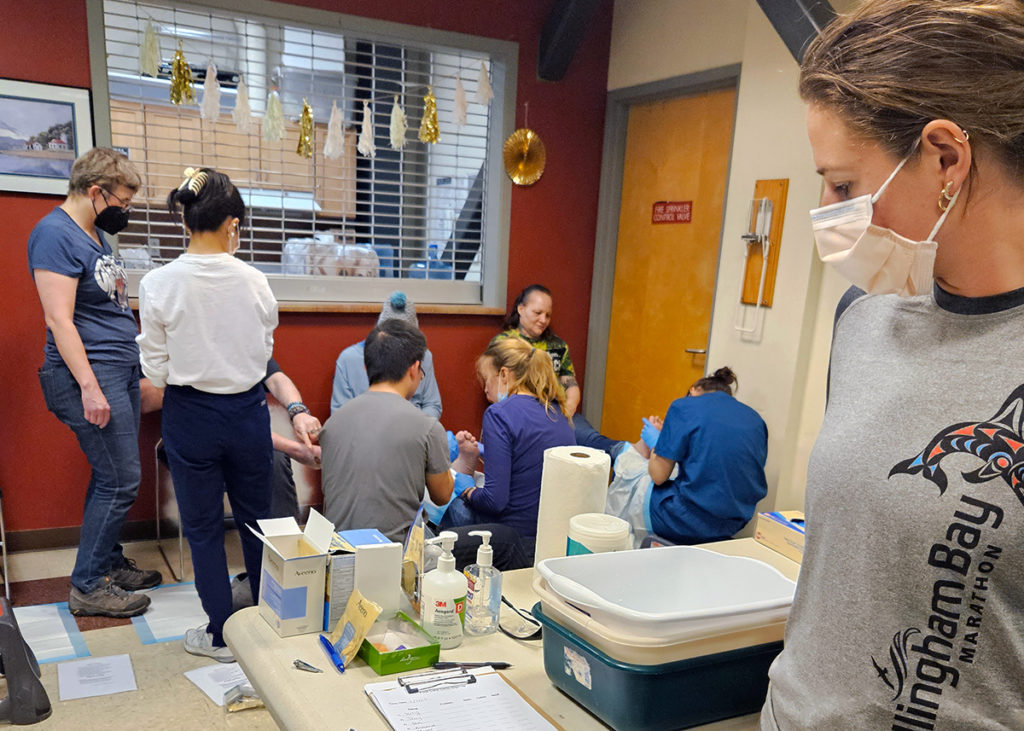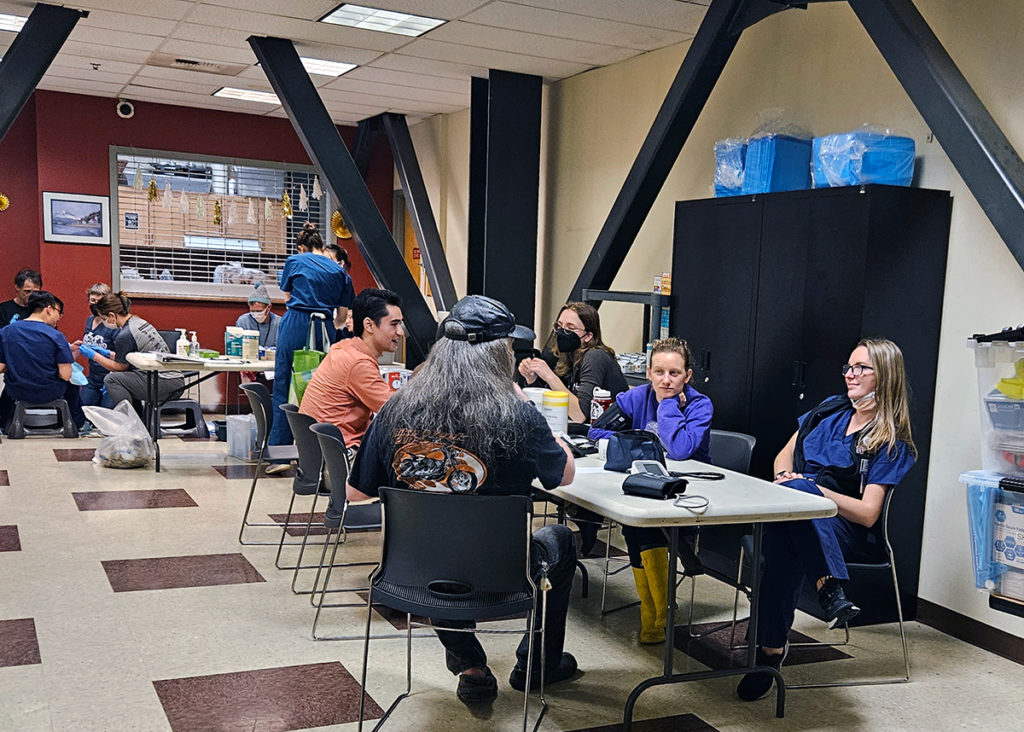Partnership with UW School of Medicine Brings Compassionate Care to Plymouth Residents
Posted March 15, 2024
As one of the largest providers of permanent supportive housing in King County, Plymouth helps individuals experiencing homelessness move into stable homes and rebuild their lives. Ending homelessness, however, is a mission we can’t accomplish alone. Partnerships with outside organizations play a key role in our ability to support residents on their housing journeys. That’s why we’re collaborating with the UW School of Medicine to bring essential health care directly to our residents.

A UW medical students works with a Plymouth Housing resident to take a blood pressure reading. Photo by Prenz Sa-Ngoun.
Working Together To Help Residents Stay Healthy
Permanent supportive housing (PSH) helps people leave homelessness behind because residents receive a high quality, long-term home—plus the supportive services they need to find stability. Plymouth provides housing case managers and front-desk staffing at each of our 17 PSH buildings in King County. But it’s partnerships with other service providers that allow us to provide a full spectrum of care for residents.
That’s where the UW School of Medicine comes in. Through our partnership with the school’s Student Health Initiative for Access (SHIFA), our residents benefit from regular on-site health care clinics at Plymouth on Stewart. Residents receive essential health care services for free from first- and second-year medical students working under the supervision of qualified instructors. The students currently provide foot care, dental hygiene kits, and screenings for issues with blood pressure or blood sugar levels. In May 2024, the group will also provide ophthalmology to treat and diagnose eye disorders.
In addition to on-site services, the medical students connect residents with primary care and specialty care medical providers outside of Plymouth Housing.
Removing Barriers to Health Care
Understanding the unique needs of someone who has experienced homelessness is at the heart of permanent supportive housing—and this value is what inspired Plymouth’s partnership with SHIFA.
“The clinics have been a beneficial service for residents with mobility issues who are not able to travel to appointments as easily or who may not be motivated to leave their building,” said David Orefice, the residential services manager at Plymouth on Stewart and a driving force behind the partnership.

The foot care offered at the clinics has been a major draw for participating Plymouth residents. Photo by Emmett Anderson.
Improving health care accessibility is what SHIFA is all about. The program aims to provide culturally competent, holistic health care to underserved communities in King County and to be leaders in creating an effective student-run health and social service model.
“Plymouth Housing shares our drive for continuous improvement, seeking opportunities for growth and turning challenges into opportunities,” said Meghan Hershkowitz, director of the SHIFA board and a UW medical student. “Together we’ve identified the unique medical needs of Plymouth residents and formed various collaborations to meet these needs.”
Caring on a Deep Level
Making it easy for all Plymouth residents to access health care is important. But for this care to be effective, providers must consider the trauma each resident has experienced. Homelessness is a traumatic event, but most Plymouth residents have also experienced abuse or neglect as children, structural racism, violence or war (for veterans), and other forms of oppression. When offered with sensitivity and openness, health care services can play a vital role in our residents’ healing.
Orefice has been impressed by the impact of these UW student clinics on residents’ physical and emotional health.
“Many of our residents are disabled and don’t have the easiest time maintaining hygiene,” he said. “The UW clinic volunteers have displayed stellar trauma-informed care in serving the residents at the foot care station, putting in effort to talk with the residents and make them feel comfortable, all while displaying a smile on their face. This simple act of service can have a significant impact on one’s self-esteem and sense of belonging.”

For participating students, the clinics are an opportunity to not only gain experience caring for patients but also learn about the real-world difficulties Plymouth residents often face in accessing appropriate and necessary care. Photo by Emmett Anderson.
For Emmett Anderson, Plymouth’s health care integration manager, it’s inspiring to see care delivered with such humanity. “The openness these medical students bring to their work is echoed in Plymouth’s evolving model of care,” Anderson said. “We can further lean into trauma-informed care by extending compassion, taking time to build trust, and leveraging familiar faces to build that trust. We welcome these moments of validation and restoration in the Plymouth community.”
It can be daunting to consider the amount of time, energy, and resources it will take to solve homelessness in King County. That’s why providers must develop innovative approaches and partnerships like the one between Plymouth and UW. These partnerships ensure that everyone has the tools they need to achieve a better quality of life. Getting someone off the streets is not enough to truly address the root cause(s) of their trauma, or what caused them to experience homelessness. Whether it’s a painful foot problem making it difficult to walk or a mental health condition that’s causing someone to live in fear or anguish, these problems must be addressed so that every resident can truly enjoy their life: safe, healthy, and in a home of their own.